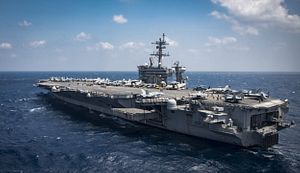Will American foreign policy have the discipline to harness realism to pursue its goals? Can the United States remain strong enough to bring prosperity to its people and preserve the world order it created after World War II, while also deploying enough restraint to keep from going overboard?
The topic of realism and restraint in American foreign policy was discussed by journalists, scholars, and politicians at a conference organized by The American Conservative, a magazine that promotes realism in foreign policy, at George Washington University in Washington, D.C. last Friday (full disclosure: The author is an editorial assistant at The American Conservative). While all the panelists agreed that ideally the United States should embrace realism and restraint, The American Conservative’s editor, Robert Merry, summarized succinctly the reality that, even in the Trump era, “there is no realism and restraint in… American foreign policy.”
Of course, this is not a characteristic of the Trump administration, but of U.S. foreign policy in general; “serious departures” from Trump are unlikely. Merry highlighted a lack of restraint during both Democratic and Republican administrations: the expansion of NATO, the invasion of Iraq, American support for the Arab spring, and so on.
Of course, the United States has international interests; restraint is not a lack of engagement with the world. “We are not isolationist,” Merry said, arguing that there is a middle ground between the ideas offered by Steve Bannon and John Bolton. But the need for restraint is clear, if the United States is to preserve its strength and deploy it purposefully.
Highlighting the issues that arise from the lack of restraint, Merry asked who the most consequential foreign policy player of the last 25 years was. It was certainly not any U.S. president, but, rather, Osama bin Laden:
Osama bin Laden touched off something, and I think he knew what he was doing. I think he knew that he was going to poke that hornet’s nest, and the hornets were going to be going all over the place… and now, he’s gotten us into this new — we didn’t even know about it until these four deaths in Niger — […] adjunct of our war on terror, which is we cannot have any nation, anywhere in the world, as far as I can tell, but certainly in Africa, to descend into chaos, because if it descends into chaos we’re going to have another Afghanistan situation, and another attack on the homeland… Think about what kind of foreign policy remit [that creates] for the United States of America… We didn’t know… we had troops all over Africa.
As a result, the United States is now committed to an endless war, and endless interventionism, at the sign of any combustible situation anywhere in the world. Al-Qaeda intended to bring the United States down through a “death by a thousand cuts strategy,” and it seems the the U.S. foreign policy establishment is playing right into this.
Meanwhile, China continues to rise as the U.S. bleeds blood and treasure into the Middle East and Africa. Paul Kennedy, author The Rise and Fall of the Great Powers, said that “the unipolar moment is over,” and as such the world is now multipolar, with China, India, and Russia joining the United States as great powers. Consequently, one country alone no longer has the military capacity or economic ability to serve as the world’s police force, and trying to do so unilaterally merely strengthens the other world powers, who are able to better preserve and utilize their resources.
Of course, it is only in a unipolar world that a country can be tempted into acting like the world’s policeman, because there are no other great powers to restrain it. In this sense, the fall of the Soviet Union had tragic consequences for the United States, because it enabled the very hubristic behavior that weakened, rather than strengthened, American power. As John Mearsheimer, professor at the University of Chicago, and a well known theorist of the realist school, said, the rise of China meant that “big power politics is back on the table,” and which would hopefully engender more realism in American foreign policy. Realism thrives when many powers are competing and establishing their respective spheres of influence. However, Mearsheimer also cautioned that the rise of realism in relation to China could also lead to a lack of restraint, as the United States tries to counter a new great power (similar arguments have been made by Graham Allison via his Thucydides trap idea).
Ultimately, according to the individuals assembled at The American Conservative’s conference, the United States may learn some realism as a result of dealing with a new world order. But it is struggling to put into practice any semblance of restraint, and will continue to overextend itself throughout the world, including in Africa, the Middle East, South Asia, and East Asia, because of the almost imperative urge by the U.S. foreign policy establishment to try to guide all sorts of events, everywhere. Regardless of who the president is in the United States, this trajectory persists, and this cannot bode well for the future of U.S. foreign policy.

































